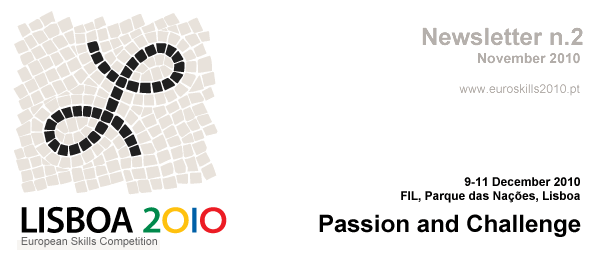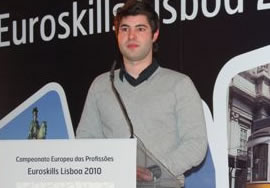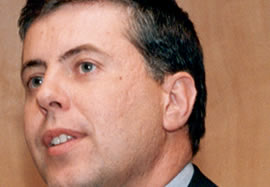 |
Editorial
December is almost here and it is almost time for Euroskills Lisboa 2010. This is the ideal time to help anyone who is interested to find out more about the event, its identity, symbols, goals and different aspects.
In this issue we will begin a cycle of information that will continue in the following editions of the ES 2010 newsletter, which we hope you will enjoy. To help you find out more about the personality of Euroskills Lisboa 2010, we have introduced our mascots Skillo and Skilla, we have issued a creativity challenge by launching a photography contest on vocations and we promote the importance of experimentation when choosing a vocation.
We have also looked at the competition clusters with a first person account from a young champion from the previous edition of Euroskills and we hear from one our partners about their expectations.
We hope you will join us and share in our pride and enthusiasm for being part of the most important European event in the filed of vocational training.
|
Mascots EuroSkills Lisboa 2010

A European event with a Portuguese identity
Lisbon will be the stage where hundreds of young people from European countries representing dozens of professions will put the excellence of their skills to the test. This will be the largest European event in vocational training, organised and made in Portugal.
Logo The Portuguese pavement stones, one of the trademarks of the city of Lisbon, were the inspiration behind the Euroskills Lisboa 2010 logo, also promoting a traditional Portuguese profession, the Paver.
The Paver is an artist who specialises in decorating sidewalks and city squares and is also a symbol of professional pride and technical and artistic aptitude, a value that cuts across many other professions that are part of this event.
The colour palette follows the Euroskills brand reference and includes the national colours: red and green.
The mascots SKILLO and his companion SKILLA are key figures of the brand. A mixture of man and robot, the Euroskills Lisboa 2010 male and female mascots employ a metaphor using hands, symbolising different professions.
The modularity of Skillo and Skilla, the strong colours that represent them, their smiles of happiness and confidence symbolising the hundreds of young Europeans that will be involved in this great competition: creative, positive, motivated and prepared to develop new skills and respond to new challenges.
|
Euroskills challenges photographers
EuroSkills Lisbon 2010 and site olhares.com are challenging Portuguese photographers' creativity with a special photo contest based on the professions' theme. The contest lasts until November and is available not only for students, but also to other people who love photography. The contest main goal is to highlight new approaches of different professions. Those who like photography and are interested in participating should go to olhares.com, sign up and let their imagination run loose. The best photographs are selected by a Jury in each of the contest's 3 stages, awarding 3 Prizes for each stage. Winners have the chance to win photographic equipment, a total of 9 Samsung EX 1 cameras.
|
Try a Trade at EuroSkills Lisboa 2010
During EuroSkills Lisboa 2010, visitors can access valuable information regarding each competing profession thanks to Try a Trade - a profession interpretation centre managed by the competition partners. The goal of Try a Trade is to inform visitors of the competitions and allow them to try each competing profession from the six areas of competition: Creative Arts & Fashion, Manufacturing & Communication Technology, Transportation & Logistics, Information & Communication Technology, Construction & Building and Social, Personal & Hospitality Services.
|
Interview Luís Barbosa - bronze medallist at the 1st edition of Euroskills in Rotterdam
Being successful in the European Vocational Championship requires determination, strong will and a winning spirit. This is what Luís Barbosa, bronze medallist in the area of Mechatronics Auto at the 1st edition of Euroskills in Rotterdam, speaks to us about.
How would you sum up your participation in Euroskills Rotterdam?
It was very positive, it greatly exceeded my expectations, competing with 20 participants from 18 European companies, finishing in third place was very good.
Why did you participate in the competition?
I participated in the Vocational Championship in Portugal and finished first. I was invited by CEPRA (Automobile Repair Vocational Training Centre) to participate in Euroskills and I did. My desire to participate and interest in the area also motivated me.
In your opinion, what is the advantage of this type of competition for the participants?
In this type of competition the participants have to prepare themselves very well technically and psychologically. Previously acquired knowledge and preparation for the contests are put to the test, challenging all of the acquired skills.
It is also a matter of technical experience, which is an asset for one’s professional background and may even open doors on the job market.
|
|

Has winning the bronze medal in EuroSkills Rotterdam opened any doors on the job market? Have you received any job offers?
Yes.
Since I participated in Euroskills, I have been invited to work for Baviera BMW of the Salvador Caetano group, which in and of itself was a great challenge. I worked there for about a year and a half. After that challenge, I was invited by CEPRA to be an instructor, another challenge I enjoy very much and it is what I am doing now.
What advice can you give to the participants of this edition of EuroSkills?
Simple: “Go for it“! If you train hard you will be as good as or better than the other participants from other countries. Only those who go in with a winning and committed attitude will get good results. Anyone who does not have this mentality should step aside and open the way for someone who is mentally stronger and has a will to win!
What is your biggest dream?
I want to learn as much as possible about my area of knowledge so I can be a good instructor and produce good technicians. In the future, a few years from now, I would like to open my own business and maybe open a Bosch Car Service. I think it is a way of providing a good technical response to the challenges that the area currently offers and also because it allows for continued training in this area.
|
|
| |
Interview regarding Social, Personal & Hospitality Services (Portugal Tourism Office)
Landmark Competition
Paulo Revés, director of the Coordination Department and School Management of the Portugal Tourism Office considers Euroskills 2010 “a landmark moment in affirming what various Portuguese entities have been accomplishing in the area of vocational training.” Held in Lisbon, the competition is significantly important to the tourism sector in terms of categories such as Cook & Serve, Hotel Reception or Cleaning Services.
How has Portugal evolved in terms of the training provided by Hotel and Tourism Schools?
We have essentially gone from training that requires almost exclusively very specific technical skills to one that is more behavioural. A concrete example is in restaurant service where the interaction of the employee with a tourist may be more relevant than the technical component, namely speaking various languages, friendliness, and indicating other places where the tourist can go afterwards.
How does that change fit in with the concept that the Portuguese are good hosts?
We had a natural talent for being good hosts (and I think we still do). All the entities that offered training in the sector focused on the technical requisites because they assumed that people’s way of behaving and being was intrinsic to them. We believe this approach did not work, as people began to act like machines. There is currently less awareness of this topic than 10 or 15 years ago and as such the interpersonal relations established between the tourist and the service provider has once again become important
What is the role of human resources in the competition between tourism destinations?
The physical conditions of the space are quite identical in a resort in the Algarve, Turkey or Croatia. What changes is the manner in which people are received and served at the hotel. Tourists will remember and want to return to the places where they had a good experience with the employees. They will remember “the people that were fantastic, friendly, kind.” What makes a difference is the human factor, it’s not the fact that a pool is bigger or that there is more or less sun.
|
|

What role does EuroSkills play in the re-qualification of the Tourism professions?
Tourism has a good image. However, there are a group of professions associated with the activity – hotel industry professions are an example of this – and are not very well regarded socially. This is the case with waiting on tables and bartending. The profession of cook used to be stigmatised, but this is currently changing because of its exposure in the media and television. Euroskills will help the other professions gain exposure so they can also be considered valuable and recognised as such by society.
What advice can you give to young participants?
Participation in an event of this magnitude is enriching, whatever the result achieved. The intense experience of those two stressful days will help them grow. I hope that they will take the best possible advantage of this moment and I wish them all the best possible performance. And I think Portugal will surprise everyone in EuroSkills 2010!
What basic characteristics do you consider essential to be successful in the tourism sector?
Today, people who work in tourism and are not good with languages will not succeed. People who speak foreign languages well (the more the better) and who like their chosen activity very much will be guaranteed success.
|
|
Cluster by Cluster
To choose you must know!
EuroSkills 2010 is a live showroom for professions. They are organised into six clusters that include the spectrum of the professions that most represent the European socio-economic fabric, considered to be the common denominator agreed by the 31 member countries of the European Skills Promotion Organization (ESPO):
- Creative Arts & Fashion
(Florist, Fashion, Window Display, Stonemasoner, Hairdresser, Goldsmith and Shoe Maker)
- Manufacturing & Engineering Technology
(Manufacturing Technologies, Electronics, Mobile Robotics, Industrial Mechatronics)
- Transportation & Logistics
(Transport Technology & Logistics, Automotive Technology Light Vehicle, Motorcycle Technology)
- Information & Communication Technology
(Installation and Operation of Information Systems, Multimedia Publication)
- Construction & Building
(Landscape Gardening and Design, Installation Technology, Building Construction, Plastering, Painting, Woodcraft Technology, Drywall System)
- Social, Personal and Hospitality Services
(Caring, Farrier, Cleaning Services, Environment Protection - Management of Environmental Systems, Kitchen and Table and Bar Service, Hotel Reception, Health and Safety Management).
Each cluster associated with a particular activity sector, is part of a group of professions of execution/development of a group of activities that satisfy demand for a large functional area that produces goods or services.
This is the case with the Tertiary Sector, which at EuroSkills is part of the Social, Personal & Hospitality Services and Transportation & Logistics Clusters, through which competition occurs on a European scale between the best professionals in the area of restaurant services, reception and hotel services, cleaning services and primary health care. The Transportation & Logistics Cluster includes activities related to maintenance/repair of vehicles and land transport.
|
| |
 |
| Organization |
 |
| Sponsors |
 |
| Competition Partners |
 |
| Institutional Partners |
 |
|